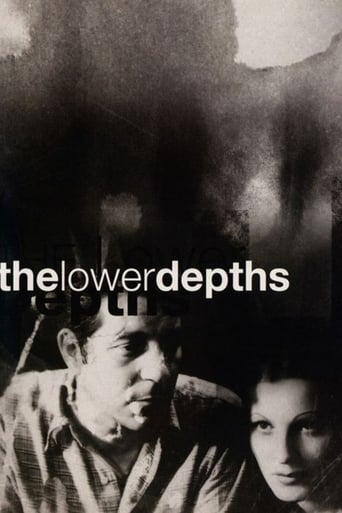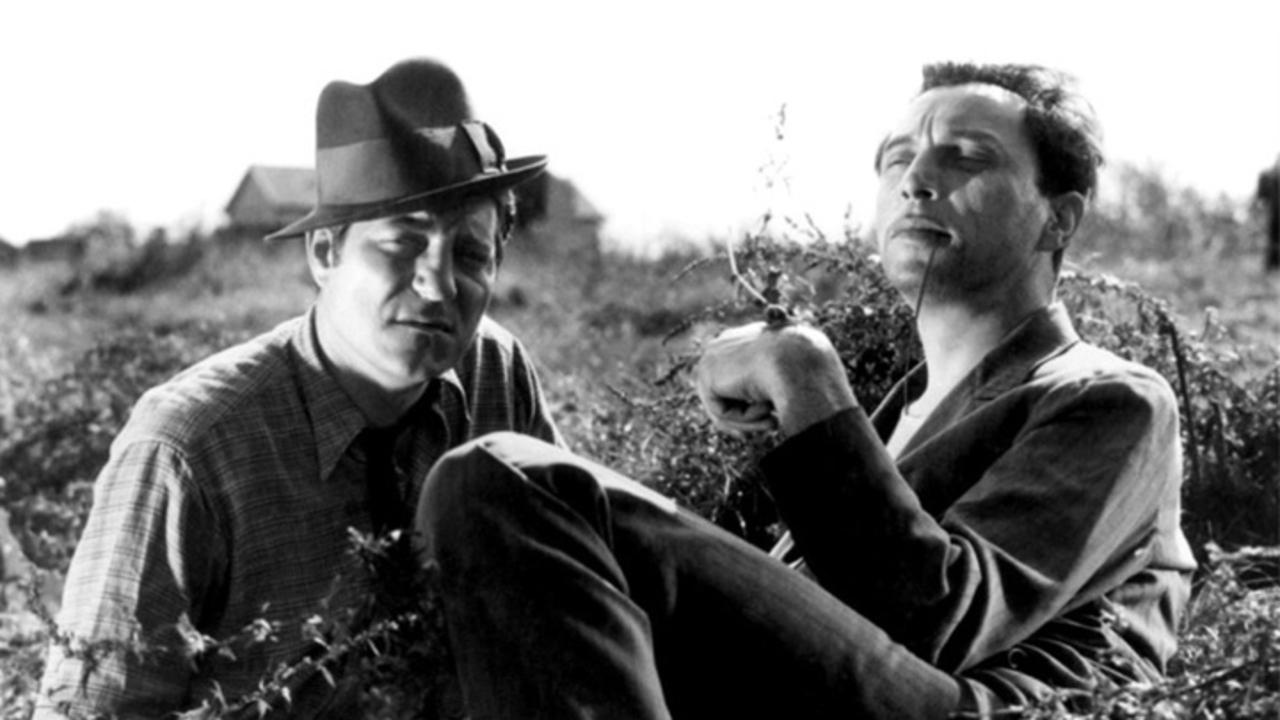Marduk1980
I was not aware of the Gorki's job and I was interesting of one of Jean Renoir's work as he is one of the best French director of all time. My global feeling was good but mixed with some aspects.First the reflexion about low class condition is good on many ways but was losing his force at the end. I think the optimistic way that it ended (Pepel going with Natasha) was an attempt to give a romantic aspect and was deviated from his social purpose. I expected a more dramatic final more realistic.Let's talk about the Baron who seems to be a central character at the beginning. In the second half, he becomes a secondary one. The first part of the movie let suggest an ambiguous relation with the main character Pepel. Nothing like this in the second part. I am wondering why there is so much emphasize in their relation at the beginning (Many fascination between each other). The rhythm is sometime unequal especially around 2/3 of the movie. There are some satisfactions: Jean Gabin has got a natural presence in front of the camera and we always enjoy seeing him. Despite of some defaults, reflexions and painting of the lower dephts are very real and authentic.Jean Renoir was following his instincts and his interests for socialism more than looking for something entertaining. There are bad aspects but I have enjoyed watching this one. Let see Kurosawa with his adaptation. Marduk
deziree
Watch this movie if only to see the soul of Jean Gabin as it plays across his face. Louis Jouvet as the Baron is a marvel of understatement, of course. Beautifully filmed, the world of black and white film is a pleasure, in this movie, to watch. The scenes and the plot remind us of life not so long ago, a life that was harsh and brutal and filled with class divisions, you were wealthy or you were wretched. It made me want to read the original play by Maxim Gorky. Apparently Yvgeny Zamyatin, a long forgotten but brilliant Russian writer, contributed to the screenplay as well. Jean Gabin is a great actor, few people recognize his marvelous talents.
aliasanythingyouwant
Jean Renoir's The Lower Depths is centered around a contrast in personalities. Jean Gabin, the great proletarian star, plays Pepel, a petty thief who remains jovial despite his restless desire to escape his deprived circumstances. While on a robbery job, Pepel meets The Baron, a disgraced nobleman, and the two strike up a friendship. These two men could not be more diametrically opposed, both in their social circumstances and their bearing. Pepel carries himself with the casual ease of a man who knows who he is, who's possessed of a basic trust in himself. The Baron, on the other hand, moves like he's perpetually running to the bathroom, his bowels - and his entire soul - afflicted with a painful case of tightness. The contrast between these two personalities, one open to life and the other closed off, is made all the more explicit by the differing acting styles of the two performers. No one was ever more natural than Gabin, with his understated charm and leonine presence. On the other side of the acting spectrum lies the extreme stylization of Louis Jouvet, who plays The Baron as a shambling collection of strained mannerisms. There's something elementally interesting about watching this clash of styles, this meeting of the naturalistic and the bizarrely theatrical. By some weird act of alchemy the two personalities, rendered in wildly different ways, mingle so pleasingly that we could scarcely ask for more.Jean Renoir has made a highly-detailed, richly-textured humanist film out of Gorky's play. The story follows the various denizens of a lower-class boarding house lorded over by the slimy Kostylev, who's married to the jealous Vassilissa, who loves the restless Pepel, who's in love with Vassilissa's abused sister Natacha. The Baron, after losing his luxurious apartments over a money scandal, moves into the boarding-house, and alone among its inhabitants discovers bliss amidst the squalor. This might seem like a rather too glaringly pro-Socialist turn-of-events, the nobleman who becomes happy when he's brought low, but it works because Louis Jouvet is so subtly funny in the way he portrays The Baron's transformation. He makes The Baron seem a little bit teched, which helps to smooth out the character's ascent from suicidal desperation to grass-dozing, snail-fondling contentment. The acting overall is marvelous: Vladimir Sokoloff plays the old landlord Kostylev as a Dickensian creep; Suzy Prim brings a bitchy edge to the ambitious Vassilissa; and Junie Astor plays Natacha with a Cinderella-like down-trodden radiance. These characters find themselves embroiled in a scenario that's a bit more straight-forwardly melodramatic than in some of Renoir's other '30s films, but the plot barely matters what with all the physical detail and accomplished emoting - all orchestrated with a master's touch by Renoir, who tinges everything with a slightly sour irony. The staging is strikingly assured from start to finish, the camera-work possessed of an under-stated expressiveness that is purely Renoir. If the film falters anywhere compared to Renoir's other work it's in the slight sense of conventional melodramatic emphasis that creeps into some of the later scenes. The storytelling is sometimes casual and organic as in Renoir's masterpieces Grand Illusion and Rules of the Game, but there are other times when the plot-mechanics show through. Renoir normally smooths over these rough-spots, but in The Lower Depths he seems to have left them in, perhaps intentionally - perhaps meaning to give the film a certain conventional sense of climax. At any rate this hardly matters - the film is so richly textured and rhythmically satisfying that we can forgive Renoir for indulging in a few theatrical flourishes. This is one of the unquestioned classics of French poetic-realism.
MarioB
Very dark but strong drama, about a bunch of people with no faith and no hope. It's very cynical, but Jean Renoir's directions gives the movie a unique twist. Great acting by Jouvet and Gabin, and young Junie Astor.


 AD
AD


